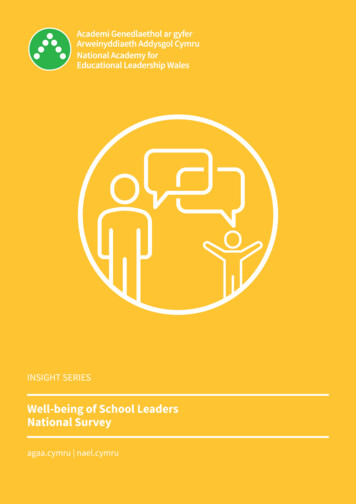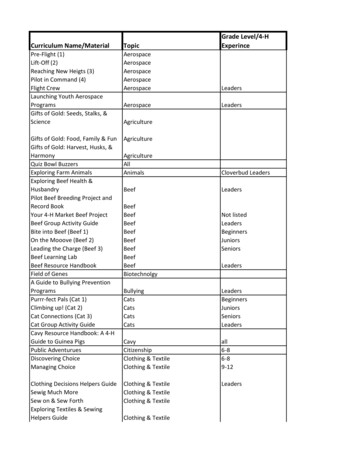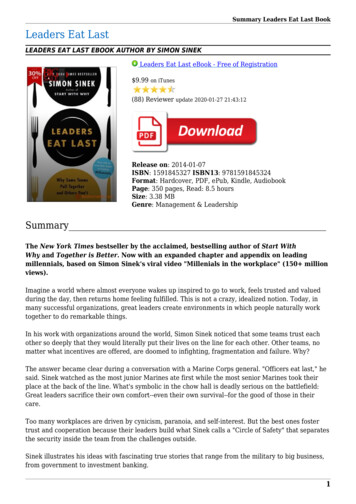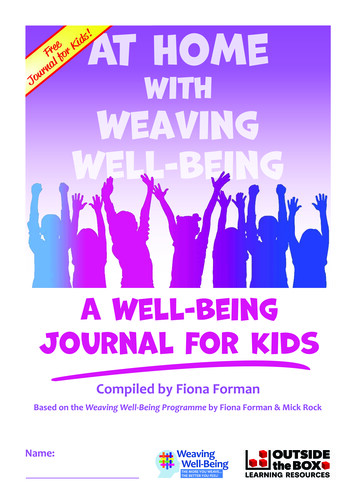
Transcription
INSIGHT SERIESWell-being of School LeadersNational Surveyagaa.cymru nael.cymru1
Key findings1. ContextThe National Academy for Educational Leadership’s (Leadership Academy) Corporate Plansets out the organisation’s commitment to helping create a Welsh education system inwhich “the well-being of educational leaders is prioritised and systematicallysupported”. As part of this commitment, the Leadership Academy is working withpartners to develop an All-Wales Strategy for the Well-Being of Educational Leaders.To inform this work, the Leadership Academy undertook a national survey of school leaders in summer2020. This report sets out the key findings of the survey.Further surveys of leaders in other educational sectors, including youth and further education, will followlater in 2020 and in 2021.2. SurveyThe survey 1 was open to school leaders 2 across Wales between 15th May and 5th June 2020.The survey received 1019 responses. However, the analysis that follows is based on 986 of these responsesas 9 entries were deemed to be from leaders not currently working in a school setting while 24 were found tobe duplicates.It should be noted that responses were received during the Covid-19 lockdown period. The important wellbeing implications of the pandemic were not part of the survey’s focus and no question made directreference to it. However, the possibility that responses were influenced by these exceptional circumstancesshould not be discounted.The survey collected a number of characteristics for each respondent for analytical purposes and these arebroken down as follows:1The survey was open to school leaders across Wales between 15th May and 5th June 2020. It consisted of 13 questions focusing on thefollowing areas: Background information, Leaders’ understanding of ‘Well-being’, Factors that impact well-being, Improving well-being and How the Academy can supportThe survey was constructed using MS Forms and trialled by a group of about 50 school leaders in the Llanelli area, before going liveacross Wales.2For the purposes of the survey, the definition of ‘school leader’ was restricted to the roles listed in Chart 3, below. The LeadershipAcademy estimates the total population of school leaders in Wales, using this definition, is approximately 3500.2
Chart 1: Response by setting0.30%2.94% 3.25%17.55%Federation1.01%Middle School (3-19)Primary SchoolPupil Referral UnitSecondary SchoolSpecial School74.95%Chart 2: Response by consortium2.74%30.02%27.08%CSCEASERWGwENot applicable12.07%28.09%3
Chart 3: Response by current role1.72%6.49%4.26%13.39%Acting Headteacher0.41%ALNCOAssistant HeadteacherBusiness ManagerDeputy Headteacher20.28%51.93%Executive HeadteacherHeadteacherSLT1.52%Chart 4: Response by leadership experience21.91%24.24%2 years or less?Between 2 and 5 years?Between 5 and 10 years?More than 10 years?28.60%25.25%4
Chart 5: Age profile of %55-5960-6465 4.77%5.00%1.22%2.23%0.00%0.10%All survey data were analysed to identify variation according to these key characteristics. However, verylittle variation by geography, age, role or setting was found and certainly none that produced anystatistically reliable findings. As a result, analysis by respondent characteristic has been excluded from thissummary level report.3. What does well-being mean to school leaders in Wales?Respondents were asked to rank ten aspects of their personal and professional well-being, from the most tothe least important. The following four aspects were ranked highest:1.2.3.4.Feeling happy or contentBeing healthyProviding for your family or those closest to youMaking a positive difference to colleagues or students5
Chart 6: Aspects of well-being ranked most to least importantFeeling happy or contentBeing healthyProviding for your family or those closest to youMaking a positive difference to colleagues or studentsWorking productivelyCoping with life's stressesFinancial securityMaking a contribution to the communityRealising ambitionsImpacting positively on the global environment01234100 200 300 400 500 600 700 800 900 10005678910Respondents were also asked to identify any other aspects of well-being that were important to them. Athematic analysis of these responses identified the following additional aspects of leaders’ well-being: Achieving work-life balance and having sufficient ‘down time’ (33% of responses)Feeling respected and trusted as a professional (12%)Putting others first (12%)4. What factors affect school leaders’ well-being?Respondents were then asked to reflect on factors affecting their well-being. The most frequently chosenfactors, from a list of 14 options, were as follows:1.2.3.4.5.Workload (chosen by 75% of respondents)Accountability measures (61%)The inspection process (50%)Staffing and personnel issues (49%)Funding and budget management (45%)6
Chart 7: Factors affecting leaders’ well-being800737Workload700600Accountability measures597The inspection processStaffing and personnel issues500400489 479Funding and budget management443Safeguarding learners373Meeting statutory responsibilitiesChildren's attitude and behaviour300277200247Curriculum development216Support from nts were then asked to provide reasons for their choices. From a thematic analysis of the free textresponses, the principal ways in which these factors affected respondents’ well-being can be identified as: Increasing levels of stress and anxietyNegatively affecting personal relationships and family lifeWorkload was chosen by three-quarters of respondents, the largest number by some margin. Furthermore,most respondents who chose ‘accountability measures’ and the ‘inspection process’ as affecting their wellbeing explained their choice in terms of the impact both things had on workload.However, a significant minority of responses identified the disconnect they perceived between process andoutcome as the reason for choosing these factors as having a negative effect on their well-being: 17% ofthose who chose ‘accountability measures’ explained that they felt such measures did not contribute tobetter learner outcomes; 28% of those who chose the ‘inspection process’ explained that they feltinspection did not add value to the school improvement journey.It is worth noting that ‘curriculum development’ was not among the most frequently chosen factorsaffecting leaders’ well-being, ranking 9th out of the 13 factors.5. Current sources of supportRespondents were then asked to consider ways in which their well-being is currently supported. The sourcesof support chosen most frequently from a list were as follows: Support from colleagues (chosen by 75% of respondents)Support from a family member (69%)Support from a manager/leader in the workplace (35%)7
It may be significant that, among the least frequently chosen, were sources of support that could collectivelybe termed ‘external interventions or services’, namely: Support from local authority / regional education consortium (17%)Support from coaching (15%)Support from a bespoke counselling service (13%)This suggests that the great majority of support for well-being currently being accessed by school leaders inWales, while hugely valuable and a key component of effective support more broadly, is not fromprofessionals with training in coaching, supervision, facilitation counselling, mental health and so on; that isto say – and with very specific reference to well-being – the support that is currently accessed in Walesremains in large part ‘non-expert’.Chart 8: Current sources of well-being support800Support from colleagues737Support from a family member677700Support from a manager/leader in the workplace.Support from your local consortium/localauthorityCoaching600500Support from a bespoke counselling 13111291Financial advice741915Career advice0Respondents were then asked to describe the main ways in which sources of support for their well-beingwere beneficial. The most frequent responses identified in a thematic analysis of the free text responseswere that sources of support were valued because they: Offered the time and space to process situations and challenges (38%)Provided a safe and supportive environment (34%)Gave the sense that leaders were understood / provided a source of empathy (29%)8
6. What more can be done by the Leadership Academy to support leaders’ wellbeing?The survey concluded by asking respondents how the Leadership Academy could support school leaders’well-being in Wales. The priority areas that the greatest proportion of respondents felt the leadershipAcademy can support were: Provide (or encourage the provision of) professional development and learning to support leaders’wellbeingProvide (or encourage the provision of) mentoring, coaching, counselling or supervisionEnsure the voice of leaders is heard with regard to their well-beingCreate spaces for leaders to talk about their experiences togetherAdvocate for change in areas of policy and practice identified as affecting leaders’ well-being,including workload, accountability and inspectionAlthough this question asked respondents to focus specifically on the role of the Leadership Academy, it isinstructive that much of what leaders say they would value as a means of further supporting their well-beingare the kinds of external interventions and services that are currently only accessed by a minority of leaders(see 5. Current sources of support, above).This suggests there is currently an undersupply of such opportunities across Wales (once again, there was nosignificant geographic variation in responses), or at least a dearth of opportunities that are seen as beingaccessible by leaders, either in terms of their quality, cost, perceived value for money or some other factoror combination of factors. This should be a focus of attention and further research for the LeadershipAcademy, its middle tier partners and Welsh Government.Report authors:Ian GerrardLeadership Academy Associate and Headteacher, Ysgol AberconwyChris LewisAssistant Director for Policy, Research and Strategic Workforce PlanningFor information on the Leadership Academy’s work on the well-being of educational leaders, visit ourwebsite or email us post@agaa.cymru9
agaa.cymru nael.cymru2
To inform this work, the Leadership Academy undertook a national survey of school leaders in summer 2020. This report sets out the key findings of the survey. Further surveys of leaders in other educational sectors, including youth and further education, will follow later in 2020 and in 2021. 2. Survey. The survey. 1. was open to school leaders. 2










